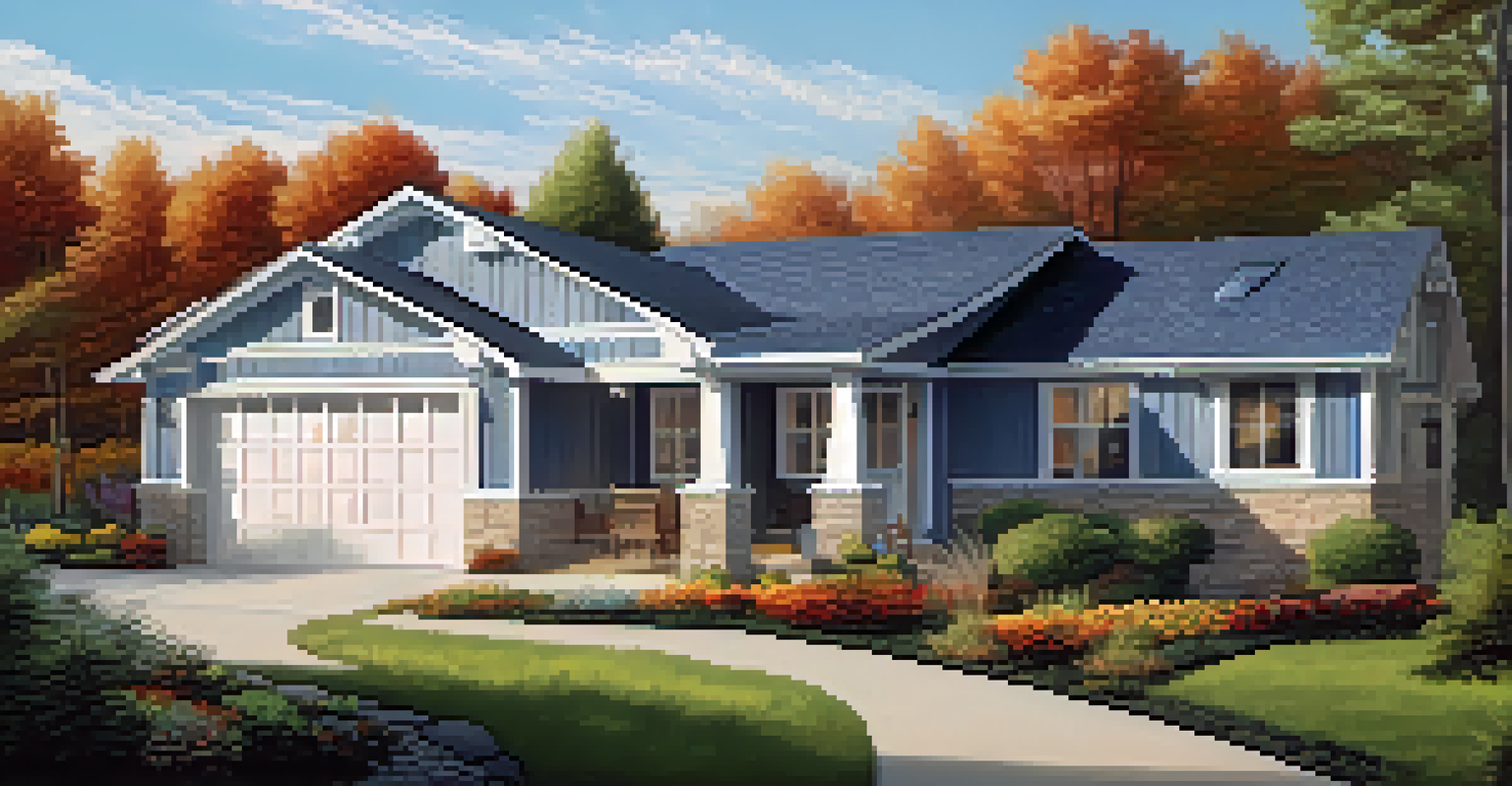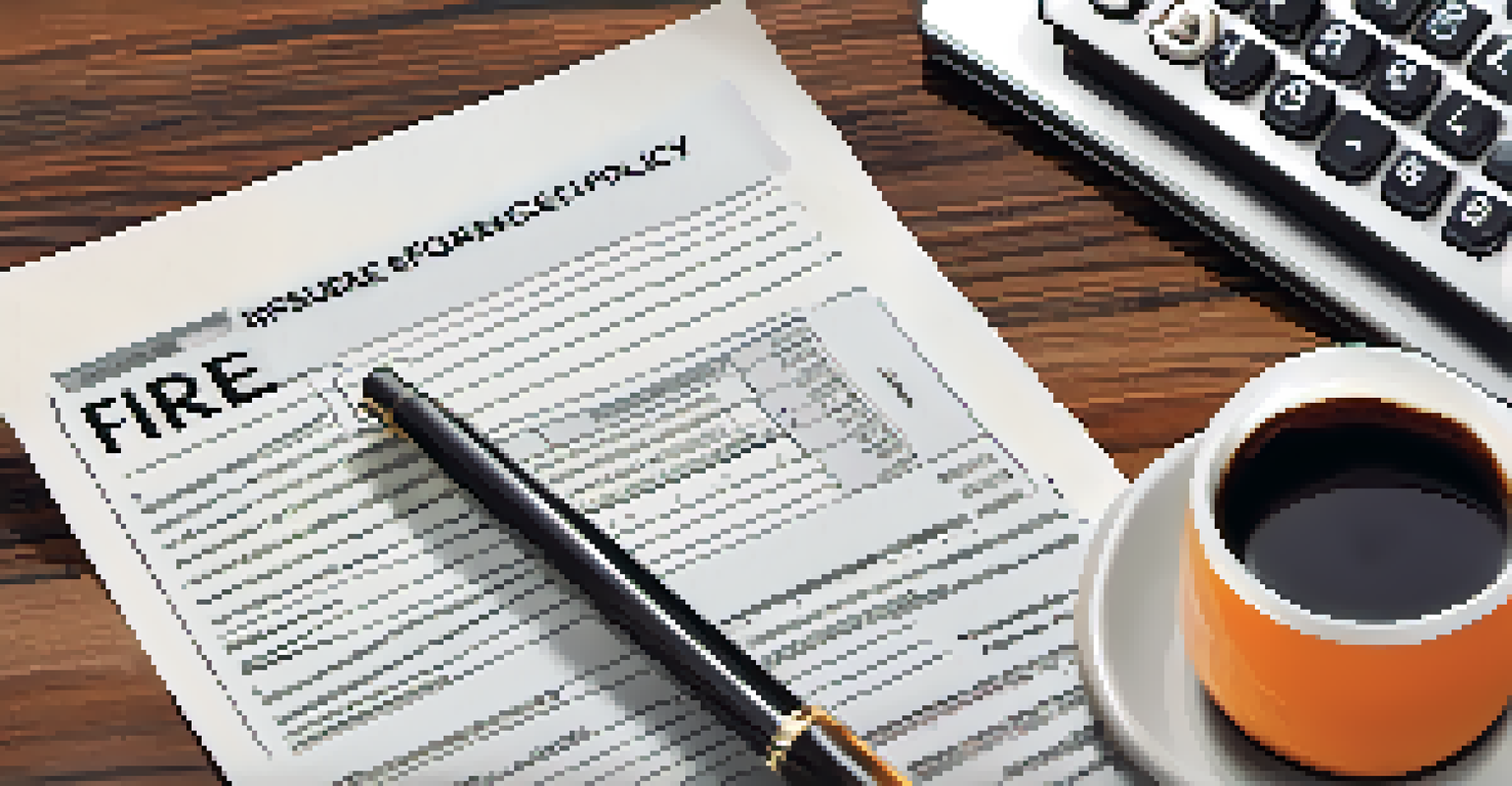Home Insurance and Fire Coverage: What Homeowners Need

Understanding Home Insurance: A Homeowner's Safety Net
Home insurance acts as a vital safety net for homeowners, covering unexpected damages and losses. It typically includes protection against theft, vandalism, and natural disasters. This safety net ensures that you can repair or rebuild your home without facing crippling financial strain.
Home insurance is not just a policy; it's a promise that protects your home and everything inside it.
For many, home insurance provides peace of mind, knowing that their investment is safeguarded. In addition to protecting the physical structure, it often covers personal belongings and liability, which is crucial for safeguarding against accidents on your property. Understanding the basics of home insurance helps homeowners make informed decisions.
Ultimately, having the right home insurance policy can mean the difference between recovery and financial hardship after a disaster. This is particularly important when considering fire coverage, which we'll delve into next.
Fire Coverage: Why It Matters for Homeowners
Fire coverage is a critical component of any home insurance policy, as it protects against the devastating effects of fire damage. This coverage typically includes the costs associated with repairing or rebuilding your home and replacing damaged belongings. Without adequate fire coverage, homeowners can face overwhelming expenses if a fire occurs.

Consider the aftermath of a fire: not only are there costs for repairs, but also potential temporary relocation expenses while your home is being restored. This can quickly add up, making fire coverage not just a luxury but a necessity for homeowners. Ensuring that your policy includes sufficient fire damage protection is essential for your financial security.
Home Insurance: A Financial Safety Net
Home insurance provides crucial protection against unexpected damages, ensuring homeowners can recover without financial strain.
Moreover, understanding specific exclusions and limits in your fire coverage will help you tailor your policy to your needs. It's wise to discuss these details with your insurance agent to avoid any surprises down the line.
Types of Fire Coverage: What’s Available?
When it comes to fire coverage, homeowners typically have several options, such as actual cash value (ACV) and replacement cost coverage. ACV policies reimburse you for the current value of your belongings after depreciation, which may not cover the full replacement costs. On the other hand, replacement cost coverage offers a more comprehensive safety net, allowing you to replace items at today’s prices.
The best time to prepare for a fire is before it happens, and having the right insurance can help you recover.
Another option some homeowners consider is extended replacement cost coverage, which provides additional funds above your policy limits in the event of a total loss. This can be particularly beneficial in areas prone to wildfires or other disasters that may strain local resources and drive up rebuilding costs.
Choosing the right type of fire coverage depends on your unique situation, including the value of your home and belongings, as well as your risk tolerance. Evaluating these factors will help you make an informed decision that aligns with your financial goals.
Common Exclusions in Fire Insurance Policies
While fire coverage is essential, it’s equally important to understand what is not covered in your home insurance policy. Many standard policies exclude damages caused by specific events, such as arson, nuclear incidents, or wear and tear. Knowing these exclusions can help you prepare for potential gaps in coverage.
For example, if your home is in a high-risk area for wildfires, your policy may not cover certain types of damage unless you purchase additional coverage. Similarly, if a fire is started due to negligence, your insurance company might deny your claim. Being aware of these limitations can save you from unexpected financial setbacks.
Understanding Fire Coverage Importance
Fire coverage is essential as it protects homeowners from overwhelming expenses related to fire damage and repair costs.
Moreover, reviewing your policy regularly can ensure it meets your current needs and risks. Engaging with your insurance provider can help clarify any uncertainties regarding exclusions, allowing you to make necessary adjustments for better protection.
Fire Safety Measures to Reduce Risk and Premiums
Implementing fire safety measures in your home not only protects your family and property but can also lead to lower insurance premiums. Simple actions like installing smoke detectors, fire extinguishers, and creating an escape plan are effective ways to enhance safety. Many insurance companies offer discounts for homeowners who take proactive steps to mitigate fire risks.
Additionally, ensuring that your home is equipped with fire-resistant materials can further decrease the likelihood of extensive damage. For instance, using non-combustible roofing and siding can be advantageous, particularly in areas prone to wildfires. These measures can make your home a safer space and reduce the cost of your insurance premiums.
Regular maintenance, such as clearing gutters and maintaining heating equipment, is also crucial in minimizing fire hazards. By taking these preventative steps, you can feel more secure in your home while potentially saving money on your insurance policy.
How to Choose the Right Home Insurance Provider
Choosing the right home insurance provider is an essential step in securing your home and assets. Start by researching various companies and comparing their policies, coverage options, and customer reviews. Look for providers that have a strong reputation for handling claims efficiently, as this can significantly affect your experience during a crisis.
It’s also wise to evaluate the financial stability of potential insurers. Agencies like AM Best or Standard & Poor’s provide ratings that can help you gauge a company’s reliability. A financially stable insurer is more likely to fulfill its obligations in the event of a fire or other disasters.
Regular Policy Review is Essential
Regularly reviewing and updating your home insurance policy ensures it meets your current needs and protects against underinsurance.
Finally, don’t hesitate to ask for referrals from friends or family who have had positive experiences. Personal recommendations can lead you to trustworthy providers who understand the unique needs of homeowners in your area.
Reviewing and Updating Your Home Insurance Policy
Regularly reviewing and updating your home insurance policy is crucial to ensure it reflects your current needs and circumstances. Life changes such as renovations, new purchases, or changes in occupancy can impact the amount of coverage you need. Keeping your policy updated ensures you’re adequately protected without overpaying for unnecessary coverage.
Additionally, it’s a good practice to reevaluate your coverage limits, especially after significant life events like acquiring new valuables or making major purchases. This can help you avoid potential underinsurance, which can lead to significant financial losses in case of a fire.

Engaging with your insurance agent annually can provide valuable insights into your coverage needs. They can guide you through the process and suggest adjustments, ensuring you have the right protection for your home and belongings.